Case Study: International Trade of Phoenix Exports China Ltd
VerifiedAdded on 2021/06/14
|16
|3644
|64
Case Study
AI Summary
This case study examines Phoenix Exports China Ltd, an export house, and its first international trade deal with Superior Imports Ltd of Brazil. The assignment delves into the critical documents and legal frameworks that govern international trade, including the Bill of Lading, International Sale Contract, Bills of Exchange, Letters of Credit, and Insurance policies. It highlights the importance of these documents in ensuring smooth transactions and protecting the interests of both the exporter and importer. The case study analyzes the clauses within these documents, such as price, delivery conditions, means of payment, and ownership, while also referencing relevant international laws like the Carriage of Goods by Sea Act, UCP 600, and the Vienna Convention. It explores the roles of various parties involved, like banks and shipping companies, and addresses potential risks like currency fluctuations and payment defaults, along with the role of export credit insurance. The study provides a detailed overview of how Phoenix Exports can navigate international trade complexities and maintain legal compliance. The assignment is a contribution to Desklib, a platform offering AI-based study tools.
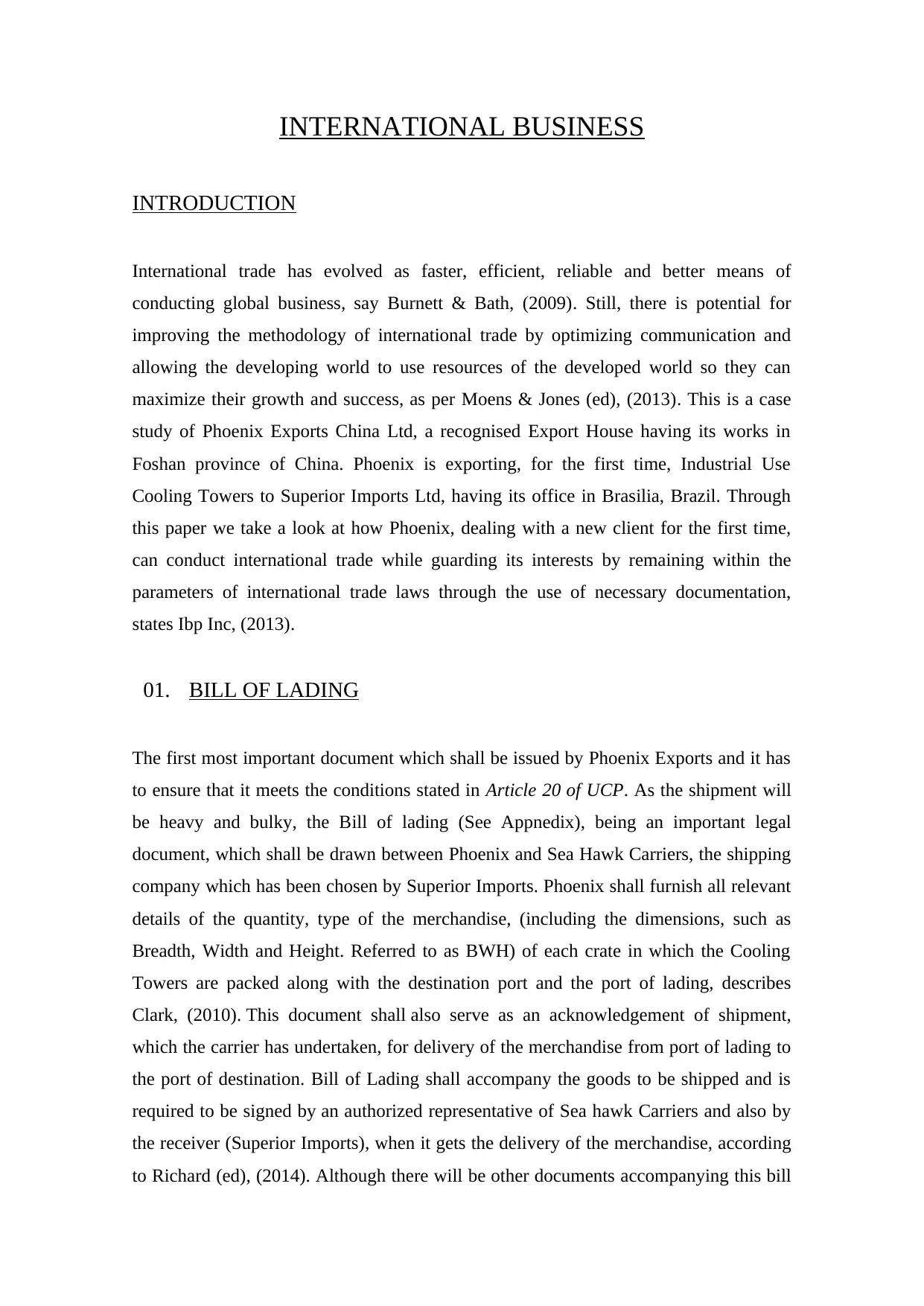
INTERNATIONAL BUSINESS
INTRODUCTION
International trade has evolved as faster, efficient, reliable and better means of
conducting global business, say Burnett & Bath, (2009). Still, there is potential for
improving the methodology of international trade by optimizing communication and
allowing the developing world to use resources of the developed world so they can
maximize their growth and success, as per Moens & Jones (ed), (2013). This is a case
study of Phoenix Exports China Ltd, a recognised Export House having its works in
Foshan province of China. Phoenix is exporting, for the first time, Industrial Use
Cooling Towers to Superior Imports Ltd, having its office in Brasilia, Brazil. Through
this paper we take a look at how Phoenix, dealing with a new client for the first time,
can conduct international trade while guarding its interests by remaining within the
parameters of international trade laws through the use of necessary documentation,
states Ibp Inc, (2013).
01. BILL OF LADING
The first most important document which shall be issued by Phoenix Exports and it has
to ensure that it meets the conditions stated in Article 20 of UCP. As the shipment will
be heavy and bulky, the Bill of lading (See Appnedix), being an important legal
document, which shall be drawn between Phoenix and Sea Hawk Carriers, the shipping
company which has been chosen by Superior Imports. Phoenix shall furnish all relevant
details of the quantity, type of the merchandise, (including the dimensions, such as
Breadth, Width and Height. Referred to as BWH) of each crate in which the Cooling
Towers are packed along with the destination port and the port of lading, describes
Clark, (2010). This document shall also serve as an acknowledgement of shipment,
which the carrier has undertaken, for delivery of the merchandise from port of lading to
the port of destination. Bill of Lading shall accompany the goods to be shipped and is
required to be signed by an authorized representative of Sea hawk Carriers and also by
the receiver (Superior Imports), when it gets the delivery of the merchandise, according
to Richard (ed), (2014). Although there will be other documents accompanying this bill
INTRODUCTION
International trade has evolved as faster, efficient, reliable and better means of
conducting global business, say Burnett & Bath, (2009). Still, there is potential for
improving the methodology of international trade by optimizing communication and
allowing the developing world to use resources of the developed world so they can
maximize their growth and success, as per Moens & Jones (ed), (2013). This is a case
study of Phoenix Exports China Ltd, a recognised Export House having its works in
Foshan province of China. Phoenix is exporting, for the first time, Industrial Use
Cooling Towers to Superior Imports Ltd, having its office in Brasilia, Brazil. Through
this paper we take a look at how Phoenix, dealing with a new client for the first time,
can conduct international trade while guarding its interests by remaining within the
parameters of international trade laws through the use of necessary documentation,
states Ibp Inc, (2013).
01. BILL OF LADING
The first most important document which shall be issued by Phoenix Exports and it has
to ensure that it meets the conditions stated in Article 20 of UCP. As the shipment will
be heavy and bulky, the Bill of lading (See Appnedix), being an important legal
document, which shall be drawn between Phoenix and Sea Hawk Carriers, the shipping
company which has been chosen by Superior Imports. Phoenix shall furnish all relevant
details of the quantity, type of the merchandise, (including the dimensions, such as
Breadth, Width and Height. Referred to as BWH) of each crate in which the Cooling
Towers are packed along with the destination port and the port of lading, describes
Clark, (2010). This document shall also serve as an acknowledgement of shipment,
which the carrier has undertaken, for delivery of the merchandise from port of lading to
the port of destination. Bill of Lading shall accompany the goods to be shipped and is
required to be signed by an authorized representative of Sea hawk Carriers and also by
the receiver (Superior Imports), when it gets the delivery of the merchandise, according
to Richard (ed), (2014). Although there will be other documents accompanying this bill
Paraphrase This Document
Need a fresh take? Get an instant paraphrase of this document with our AI Paraphraser
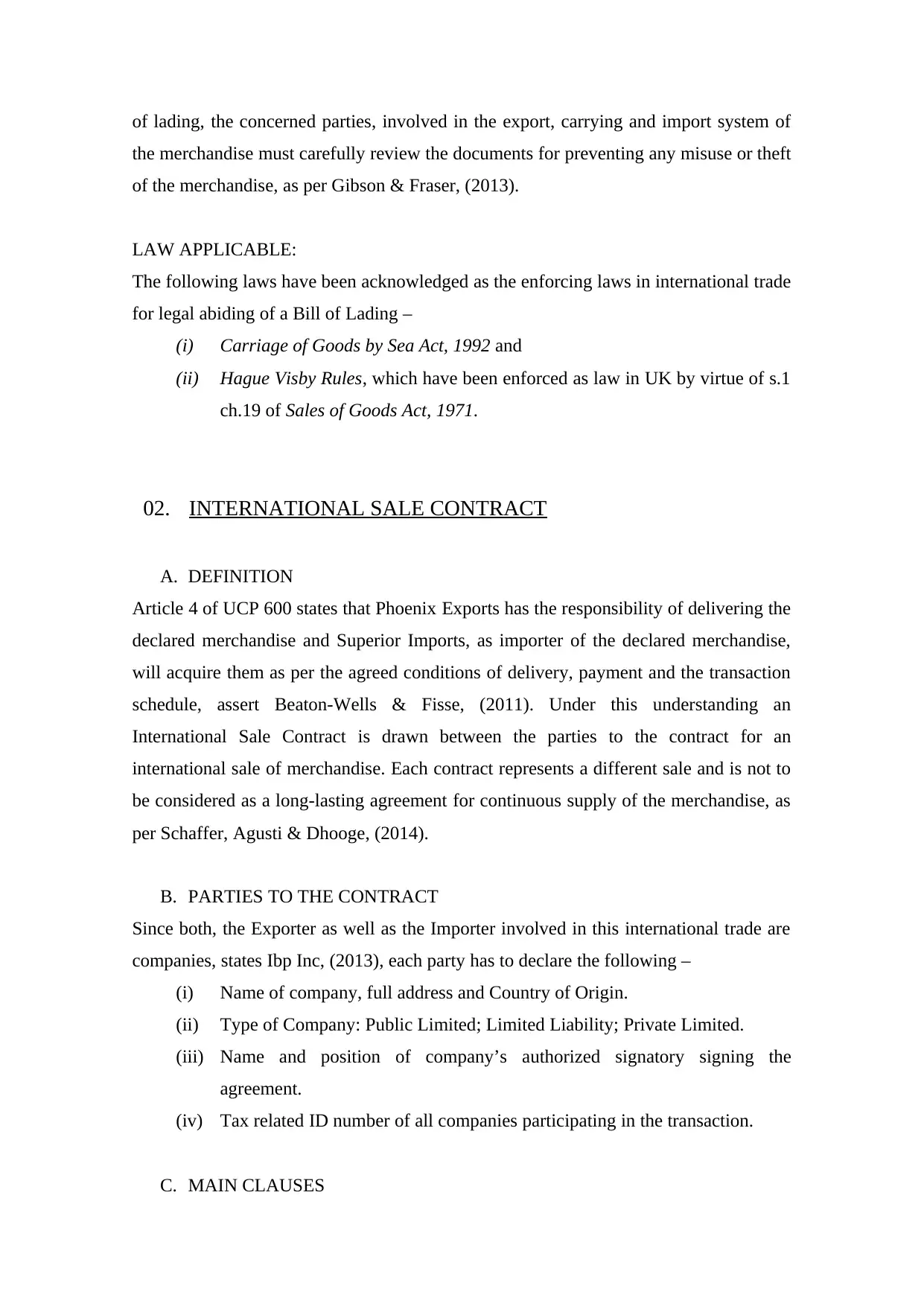
of lading, the concerned parties, involved in the export, carrying and import system of
the merchandise must carefully review the documents for preventing any misuse or theft
of the merchandise, as per Gibson & Fraser, (2013).
LAW APPLICABLE:
The following laws have been acknowledged as the enforcing laws in international trade
for legal abiding of a Bill of Lading –
(i) Carriage of Goods by Sea Act, 1992 and
(ii) Hague Visby Rules, which have been enforced as law in UK by virtue of s.1
ch.19 of Sales of Goods Act, 1971.
02. INTERNATIONAL SALE CONTRACT
A. DEFINITION
Article 4 of UCP 600 states that Phoenix Exports has the responsibility of delivering the
declared merchandise and Superior Imports, as importer of the declared merchandise,
will acquire them as per the agreed conditions of delivery, payment and the transaction
schedule, assert Beaton-Wells & Fisse, (2011). Under this understanding an
International Sale Contract is drawn between the parties to the contract for an
international sale of merchandise. Each contract represents a different sale and is not to
be considered as a long-lasting agreement for continuous supply of the merchandise, as
per Schaffer, Agusti & Dhooge, (2014).
B. PARTIES TO THE CONTRACT
Since both, the Exporter as well as the Importer involved in this international trade are
companies, states Ibp Inc, (2013), each party has to declare the following –
(i) Name of company, full address and Country of Origin.
(ii) Type of Company: Public Limited; Limited Liability; Private Limited.
(iii) Name and position of company’s authorized signatory signing the
agreement.
(iv) Tax related ID number of all companies participating in the transaction.
C. MAIN CLAUSES
the merchandise must carefully review the documents for preventing any misuse or theft
of the merchandise, as per Gibson & Fraser, (2013).
LAW APPLICABLE:
The following laws have been acknowledged as the enforcing laws in international trade
for legal abiding of a Bill of Lading –
(i) Carriage of Goods by Sea Act, 1992 and
(ii) Hague Visby Rules, which have been enforced as law in UK by virtue of s.1
ch.19 of Sales of Goods Act, 1971.
02. INTERNATIONAL SALE CONTRACT
A. DEFINITION
Article 4 of UCP 600 states that Phoenix Exports has the responsibility of delivering the
declared merchandise and Superior Imports, as importer of the declared merchandise,
will acquire them as per the agreed conditions of delivery, payment and the transaction
schedule, assert Beaton-Wells & Fisse, (2011). Under this understanding an
International Sale Contract is drawn between the parties to the contract for an
international sale of merchandise. Each contract represents a different sale and is not to
be considered as a long-lasting agreement for continuous supply of the merchandise, as
per Schaffer, Agusti & Dhooge, (2014).
B. PARTIES TO THE CONTRACT
Since both, the Exporter as well as the Importer involved in this international trade are
companies, states Ibp Inc, (2013), each party has to declare the following –
(i) Name of company, full address and Country of Origin.
(ii) Type of Company: Public Limited; Limited Liability; Private Limited.
(iii) Name and position of company’s authorized signatory signing the
agreement.
(iv) Tax related ID number of all companies participating in the transaction.
C. MAIN CLAUSES
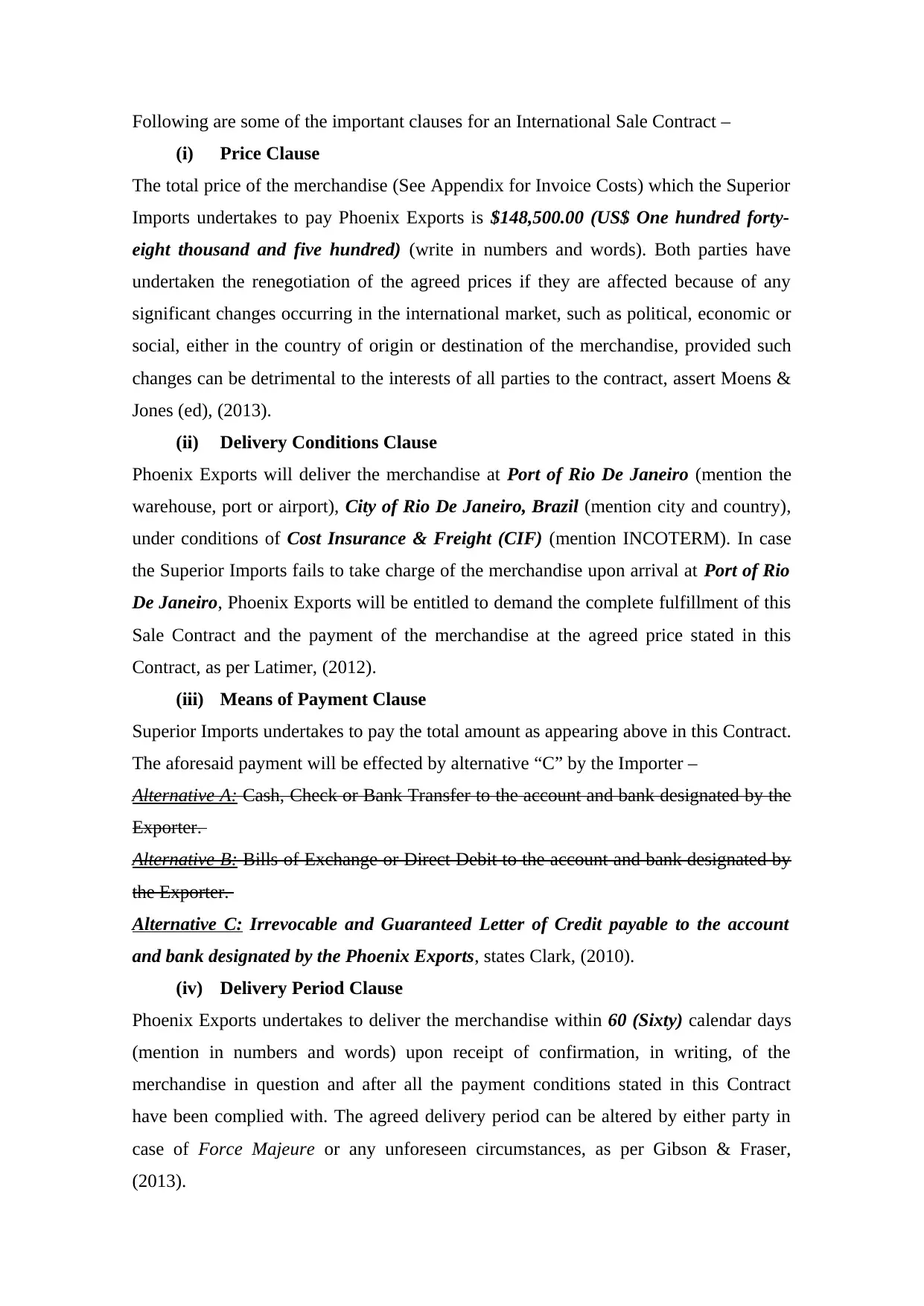
Following are some of the important clauses for an International Sale Contract –
(i) Price Clause
The total price of the merchandise (See Appendix for Invoice Costs) which the Superior
Imports undertakes to pay Phoenix Exports is $148,500.00 (US$ One hundred forty-
eight thousand and five hundred) (write in numbers and words). Both parties have
undertaken the renegotiation of the agreed prices if they are affected because of any
significant changes occurring in the international market, such as political, economic or
social, either in the country of origin or destination of the merchandise, provided such
changes can be detrimental to the interests of all parties to the contract, assert Moens &
Jones (ed), (2013).
(ii) Delivery Conditions Clause
Phoenix Exports will deliver the merchandise at Port of Rio De Janeiro (mention the
warehouse, port or airport), City of Rio De Janeiro, Brazil (mention city and country),
under conditions of Cost Insurance & Freight (CIF) (mention INCOTERM). In case
the Superior Imports fails to take charge of the merchandise upon arrival at Port of Rio
De Janeiro, Phoenix Exports will be entitled to demand the complete fulfillment of this
Sale Contract and the payment of the merchandise at the agreed price stated in this
Contract, as per Latimer, (2012).
(iii) Means of Payment Clause
Superior Imports undertakes to pay the total amount as appearing above in this Contract.
The aforesaid payment will be effected by alternative “C” by the Importer –
Alternative A: Cash, Check or Bank Transfer to the account and bank designated by the
Exporter.
Alternative B: Bills of Exchange or Direct Debit to the account and bank designated by
the Exporter.
Alternative C: Irrevocable and Guaranteed Letter of Credit payable to the account
and bank designated by the Phoenix Exports, states Clark, (2010).
(iv) Delivery Period Clause
Phoenix Exports undertakes to deliver the merchandise within 60 (Sixty) calendar days
(mention in numbers and words) upon receipt of confirmation, in writing, of the
merchandise in question and after all the payment conditions stated in this Contract
have been complied with. The agreed delivery period can be altered by either party in
case of Force Majeure or any unforeseen circumstances, as per Gibson & Fraser,
(2013).
(i) Price Clause
The total price of the merchandise (See Appendix for Invoice Costs) which the Superior
Imports undertakes to pay Phoenix Exports is $148,500.00 (US$ One hundred forty-
eight thousand and five hundred) (write in numbers and words). Both parties have
undertaken the renegotiation of the agreed prices if they are affected because of any
significant changes occurring in the international market, such as political, economic or
social, either in the country of origin or destination of the merchandise, provided such
changes can be detrimental to the interests of all parties to the contract, assert Moens &
Jones (ed), (2013).
(ii) Delivery Conditions Clause
Phoenix Exports will deliver the merchandise at Port of Rio De Janeiro (mention the
warehouse, port or airport), City of Rio De Janeiro, Brazil (mention city and country),
under conditions of Cost Insurance & Freight (CIF) (mention INCOTERM). In case
the Superior Imports fails to take charge of the merchandise upon arrival at Port of Rio
De Janeiro, Phoenix Exports will be entitled to demand the complete fulfillment of this
Sale Contract and the payment of the merchandise at the agreed price stated in this
Contract, as per Latimer, (2012).
(iii) Means of Payment Clause
Superior Imports undertakes to pay the total amount as appearing above in this Contract.
The aforesaid payment will be effected by alternative “C” by the Importer –
Alternative A: Cash, Check or Bank Transfer to the account and bank designated by the
Exporter.
Alternative B: Bills of Exchange or Direct Debit to the account and bank designated by
the Exporter.
Alternative C: Irrevocable and Guaranteed Letter of Credit payable to the account
and bank designated by the Phoenix Exports, states Clark, (2010).
(iv) Delivery Period Clause
Phoenix Exports undertakes to deliver the merchandise within 60 (Sixty) calendar days
(mention in numbers and words) upon receipt of confirmation, in writing, of the
merchandise in question and after all the payment conditions stated in this Contract
have been complied with. The agreed delivery period can be altered by either party in
case of Force Majeure or any unforeseen circumstances, as per Gibson & Fraser,
(2013).
⊘ This is a preview!⊘
Do you want full access?
Subscribe today to unlock all pages.

Trusted by 1+ million students worldwide
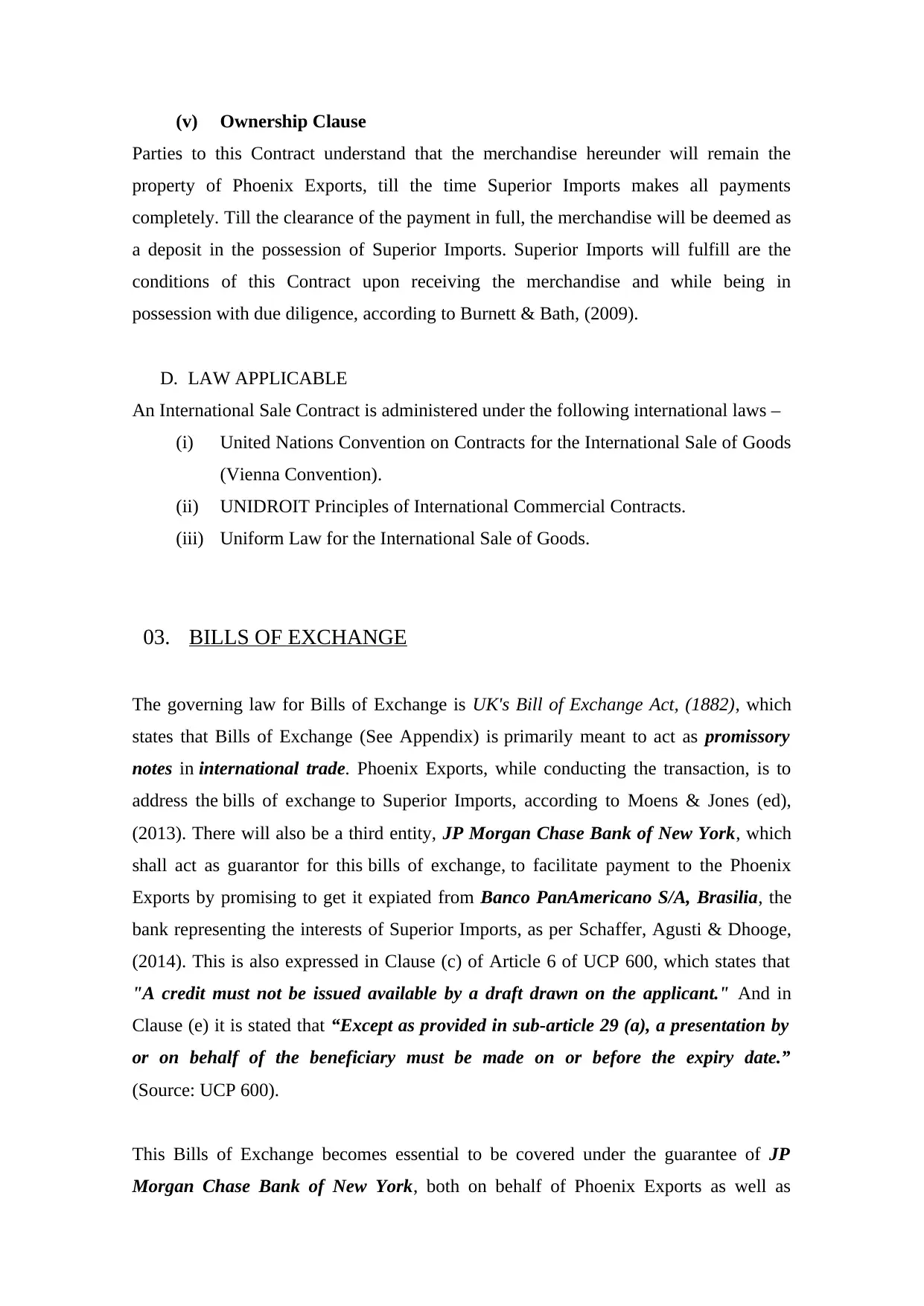
(v) Ownership Clause
Parties to this Contract understand that the merchandise hereunder will remain the
property of Phoenix Exports, till the time Superior Imports makes all payments
completely. Till the clearance of the payment in full, the merchandise will be deemed as
a deposit in the possession of Superior Imports. Superior Imports will fulfill are the
conditions of this Contract upon receiving the merchandise and while being in
possession with due diligence, according to Burnett & Bath, (2009).
D. LAW APPLICABLE
An International Sale Contract is administered under the following international laws –
(i) United Nations Convention on Contracts for the International Sale of Goods
(Vienna Convention).
(ii) UNIDROIT Principles of International Commercial Contracts.
(iii) Uniform Law for the International Sale of Goods.
03. BILLS OF EXCHANGE
The governing law for Bills of Exchange is UK's Bill of Exchange Act, (1882), which
states that Bills of Exchange (See Appendix) is primarily meant to act as promissory
notes in international trade. Phoenix Exports, while conducting the transaction, is to
address the bills of exchange to Superior Imports, according to Moens & Jones (ed),
(2013). There will also be a third entity, JP Morgan Chase Bank of New York, which
shall act as guarantor for this bills of exchange, to facilitate payment to the Phoenix
Exports by promising to get it expiated from Banco PanAmericano S/A, Brasilia, the
bank representing the interests of Superior Imports, as per Schaffer, Agusti & Dhooge,
(2014). This is also expressed in Clause (c) of Article 6 of UCP 600, which states that
"A credit must not be issued available by a draft drawn on the applicant." And in
Clause (e) it is stated that “Except as provided in sub-article 29 (a), a presentation by
or on behalf of the beneficiary must be made on or before the expiry date.”
(Source: UCP 600).
This Bills of Exchange becomes essential to be covered under the guarantee of JP
Morgan Chase Bank of New York, both on behalf of Phoenix Exports as well as
Parties to this Contract understand that the merchandise hereunder will remain the
property of Phoenix Exports, till the time Superior Imports makes all payments
completely. Till the clearance of the payment in full, the merchandise will be deemed as
a deposit in the possession of Superior Imports. Superior Imports will fulfill are the
conditions of this Contract upon receiving the merchandise and while being in
possession with due diligence, according to Burnett & Bath, (2009).
D. LAW APPLICABLE
An International Sale Contract is administered under the following international laws –
(i) United Nations Convention on Contracts for the International Sale of Goods
(Vienna Convention).
(ii) UNIDROIT Principles of International Commercial Contracts.
(iii) Uniform Law for the International Sale of Goods.
03. BILLS OF EXCHANGE
The governing law for Bills of Exchange is UK's Bill of Exchange Act, (1882), which
states that Bills of Exchange (See Appendix) is primarily meant to act as promissory
notes in international trade. Phoenix Exports, while conducting the transaction, is to
address the bills of exchange to Superior Imports, according to Moens & Jones (ed),
(2013). There will also be a third entity, JP Morgan Chase Bank of New York, which
shall act as guarantor for this bills of exchange, to facilitate payment to the Phoenix
Exports by promising to get it expiated from Banco PanAmericano S/A, Brasilia, the
bank representing the interests of Superior Imports, as per Schaffer, Agusti & Dhooge,
(2014). This is also expressed in Clause (c) of Article 6 of UCP 600, which states that
"A credit must not be issued available by a draft drawn on the applicant." And in
Clause (e) it is stated that “Except as provided in sub-article 29 (a), a presentation by
or on behalf of the beneficiary must be made on or before the expiry date.”
(Source: UCP 600).
This Bills of Exchange becomes essential to be covered under the guarantee of JP
Morgan Chase Bank of New York, both on behalf of Phoenix Exports as well as
Paraphrase This Document
Need a fresh take? Get an instant paraphrase of this document with our AI Paraphraser
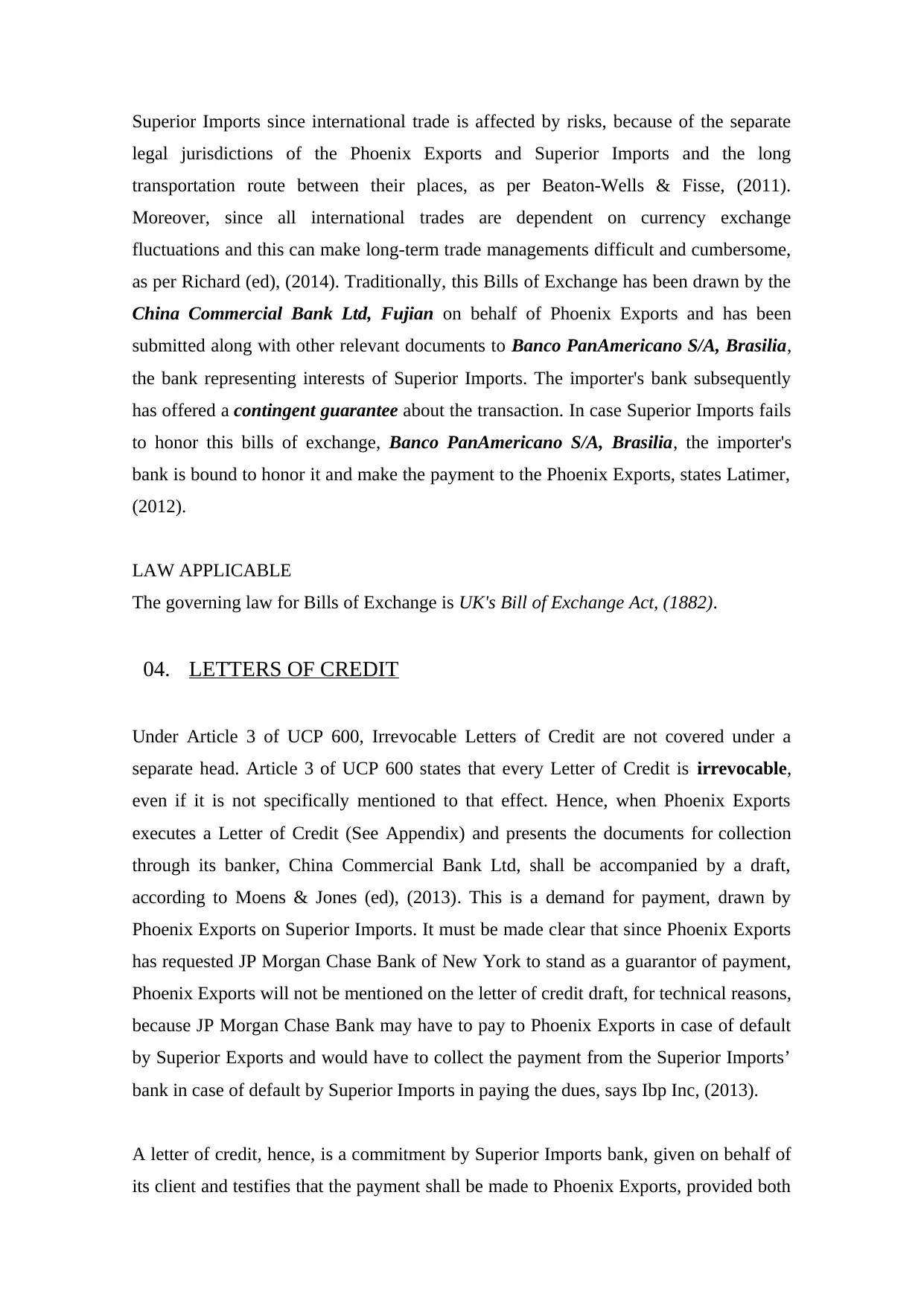
Superior Imports since international trade is affected by risks, because of the separate
legal jurisdictions of the Phoenix Exports and Superior Imports and the long
transportation route between their places, as per Beaton-Wells & Fisse, (2011).
Moreover, since all international trades are dependent on currency exchange
fluctuations and this can make long-term trade managements difficult and cumbersome,
as per Richard (ed), (2014). Traditionally, this Bills of Exchange has been drawn by the
China Commercial Bank Ltd, Fujian on behalf of Phoenix Exports and has been
submitted along with other relevant documents to Banco PanAmericano S/A, Brasilia,
the bank representing interests of Superior Imports. The importer's bank subsequently
has offered a contingent guarantee about the transaction. In case Superior Imports fails
to honor this bills of exchange, Banco PanAmericano S/A, Brasilia, the importer's
bank is bound to honor it and make the payment to the Phoenix Exports, states Latimer,
(2012).
LAW APPLICABLE
The governing law for Bills of Exchange is UK's Bill of Exchange Act, (1882).
04. LETTERS OF CREDIT
Under Article 3 of UCP 600, Irrevocable Letters of Credit are not covered under a
separate head. Article 3 of UCP 600 states that every Letter of Credit is irrevocable,
even if it is not specifically mentioned to that effect. Hence, when Phoenix Exports
executes a Letter of Credit (See Appendix) and presents the documents for collection
through its banker, China Commercial Bank Ltd, shall be accompanied by a draft,
according to Moens & Jones (ed), (2013). This is a demand for payment, drawn by
Phoenix Exports on Superior Imports. It must be made clear that since Phoenix Exports
has requested JP Morgan Chase Bank of New York to stand as a guarantor of payment,
Phoenix Exports will not be mentioned on the letter of credit draft, for technical reasons,
because JP Morgan Chase Bank may have to pay to Phoenix Exports in case of default
by Superior Exports and would have to collect the payment from the Superior Imports’
bank in case of default by Superior Imports in paying the dues, says Ibp Inc, (2013).
A letter of credit, hence, is a commitment by Superior Imports bank, given on behalf of
its client and testifies that the payment shall be made to Phoenix Exports, provided both
legal jurisdictions of the Phoenix Exports and Superior Imports and the long
transportation route between their places, as per Beaton-Wells & Fisse, (2011).
Moreover, since all international trades are dependent on currency exchange
fluctuations and this can make long-term trade managements difficult and cumbersome,
as per Richard (ed), (2014). Traditionally, this Bills of Exchange has been drawn by the
China Commercial Bank Ltd, Fujian on behalf of Phoenix Exports and has been
submitted along with other relevant documents to Banco PanAmericano S/A, Brasilia,
the bank representing interests of Superior Imports. The importer's bank subsequently
has offered a contingent guarantee about the transaction. In case Superior Imports fails
to honor this bills of exchange, Banco PanAmericano S/A, Brasilia, the importer's
bank is bound to honor it and make the payment to the Phoenix Exports, states Latimer,
(2012).
LAW APPLICABLE
The governing law for Bills of Exchange is UK's Bill of Exchange Act, (1882).
04. LETTERS OF CREDIT
Under Article 3 of UCP 600, Irrevocable Letters of Credit are not covered under a
separate head. Article 3 of UCP 600 states that every Letter of Credit is irrevocable,
even if it is not specifically mentioned to that effect. Hence, when Phoenix Exports
executes a Letter of Credit (See Appendix) and presents the documents for collection
through its banker, China Commercial Bank Ltd, shall be accompanied by a draft,
according to Moens & Jones (ed), (2013). This is a demand for payment, drawn by
Phoenix Exports on Superior Imports. It must be made clear that since Phoenix Exports
has requested JP Morgan Chase Bank of New York to stand as a guarantor of payment,
Phoenix Exports will not be mentioned on the letter of credit draft, for technical reasons,
because JP Morgan Chase Bank may have to pay to Phoenix Exports in case of default
by Superior Exports and would have to collect the payment from the Superior Imports’
bank in case of default by Superior Imports in paying the dues, says Ibp Inc, (2013).
A letter of credit, hence, is a commitment by Superior Imports bank, given on behalf of
its client and testifies that the payment shall be made to Phoenix Exports, provided both
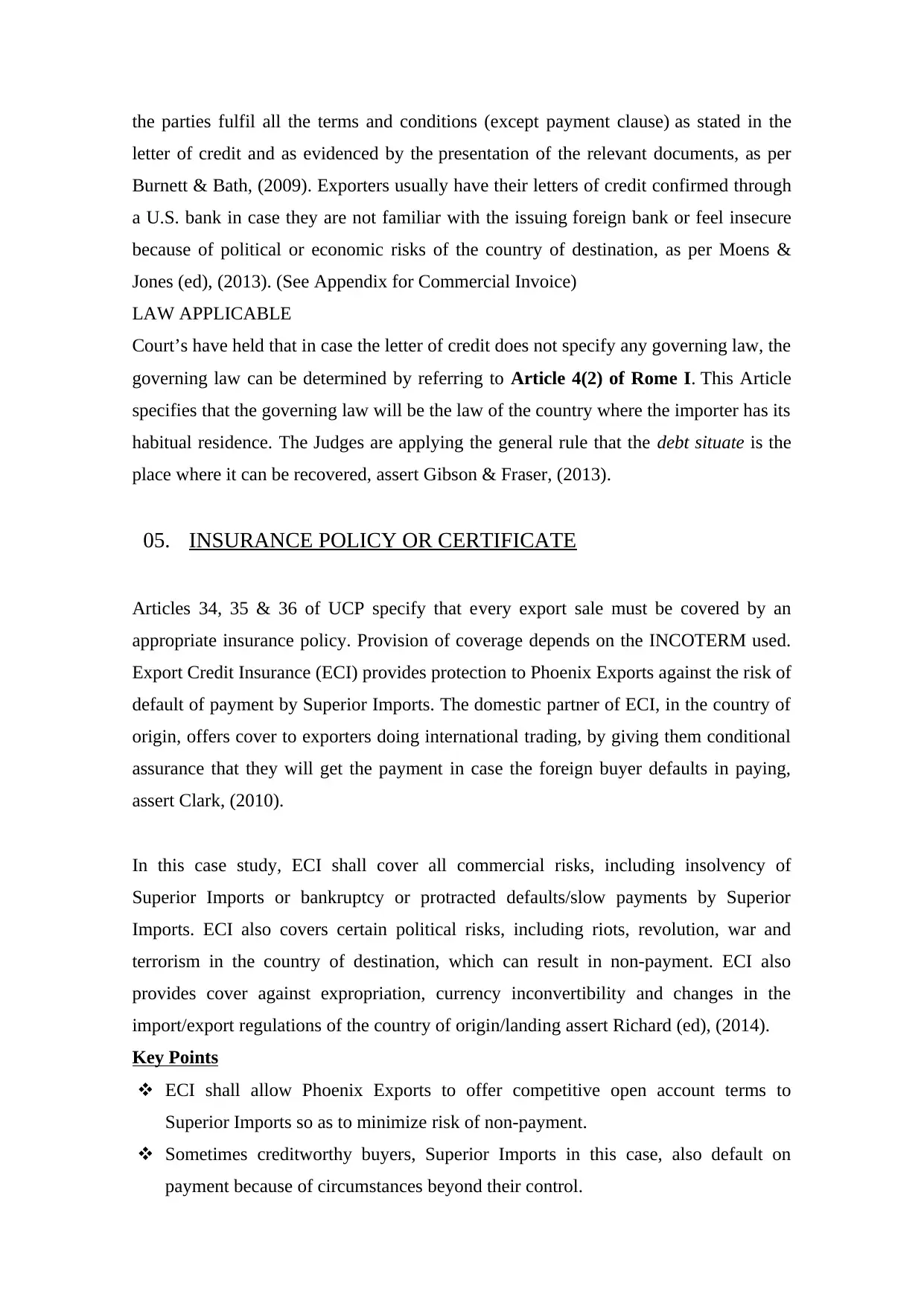
the parties fulfil all the terms and conditions (except payment clause) as stated in the
letter of credit and as evidenced by the presentation of the relevant documents, as per
Burnett & Bath, (2009). Exporters usually have their letters of credit confirmed through
a U.S. bank in case they are not familiar with the issuing foreign bank or feel insecure
because of political or economic risks of the country of destination, as per Moens &
Jones (ed), (2013). (See Appendix for Commercial Invoice)
LAW APPLICABLE
Court’s have held that in case the letter of credit does not specify any governing law, the
governing law can be determined by referring to Article 4(2) of Rome I. This Article
specifies that the governing law will be the law of the country where the importer has its
habitual residence. The Judges are applying the general rule that the debt situate is the
place where it can be recovered, assert Gibson & Fraser, (2013).
05. INSURANCE POLICY OR CERTIFICATE
Articles 34, 35 & 36 of UCP specify that every export sale must be covered by an
appropriate insurance policy. Provision of coverage depends on the INCOTERM used.
Export Credit Insurance (ECI) provides protection to Phoenix Exports against the risk of
default of payment by Superior Imports. The domestic partner of ECI, in the country of
origin, offers cover to exporters doing international trading, by giving them conditional
assurance that they will get the payment in case the foreign buyer defaults in paying,
assert Clark, (2010).
In this case study, ECI shall cover all commercial risks, including insolvency of
Superior Imports or bankruptcy or protracted defaults/slow payments by Superior
Imports. ECI also covers certain political risks, including riots, revolution, war and
terrorism in the country of destination, which can result in non-payment. ECI also
provides cover against expropriation, currency inconvertibility and changes in the
import/export regulations of the country of origin/landing assert Richard (ed), (2014).
Key Points
ECI shall allow Phoenix Exports to offer competitive open account terms to
Superior Imports so as to minimize risk of non-payment.
Sometimes creditworthy buyers, Superior Imports in this case, also default on
payment because of circumstances beyond their control.
letter of credit and as evidenced by the presentation of the relevant documents, as per
Burnett & Bath, (2009). Exporters usually have their letters of credit confirmed through
a U.S. bank in case they are not familiar with the issuing foreign bank or feel insecure
because of political or economic risks of the country of destination, as per Moens &
Jones (ed), (2013). (See Appendix for Commercial Invoice)
LAW APPLICABLE
Court’s have held that in case the letter of credit does not specify any governing law, the
governing law can be determined by referring to Article 4(2) of Rome I. This Article
specifies that the governing law will be the law of the country where the importer has its
habitual residence. The Judges are applying the general rule that the debt situate is the
place where it can be recovered, assert Gibson & Fraser, (2013).
05. INSURANCE POLICY OR CERTIFICATE
Articles 34, 35 & 36 of UCP specify that every export sale must be covered by an
appropriate insurance policy. Provision of coverage depends on the INCOTERM used.
Export Credit Insurance (ECI) provides protection to Phoenix Exports against the risk of
default of payment by Superior Imports. The domestic partner of ECI, in the country of
origin, offers cover to exporters doing international trading, by giving them conditional
assurance that they will get the payment in case the foreign buyer defaults in paying,
assert Clark, (2010).
In this case study, ECI shall cover all commercial risks, including insolvency of
Superior Imports or bankruptcy or protracted defaults/slow payments by Superior
Imports. ECI also covers certain political risks, including riots, revolution, war and
terrorism in the country of destination, which can result in non-payment. ECI also
provides cover against expropriation, currency inconvertibility and changes in the
import/export regulations of the country of origin/landing assert Richard (ed), (2014).
Key Points
ECI shall allow Phoenix Exports to offer competitive open account terms to
Superior Imports so as to minimize risk of non-payment.
Sometimes creditworthy buyers, Superior Imports in this case, also default on
payment because of circumstances beyond their control.
⊘ This is a preview!⊘
Do you want full access?
Subscribe today to unlock all pages.

Trusted by 1+ million students worldwide
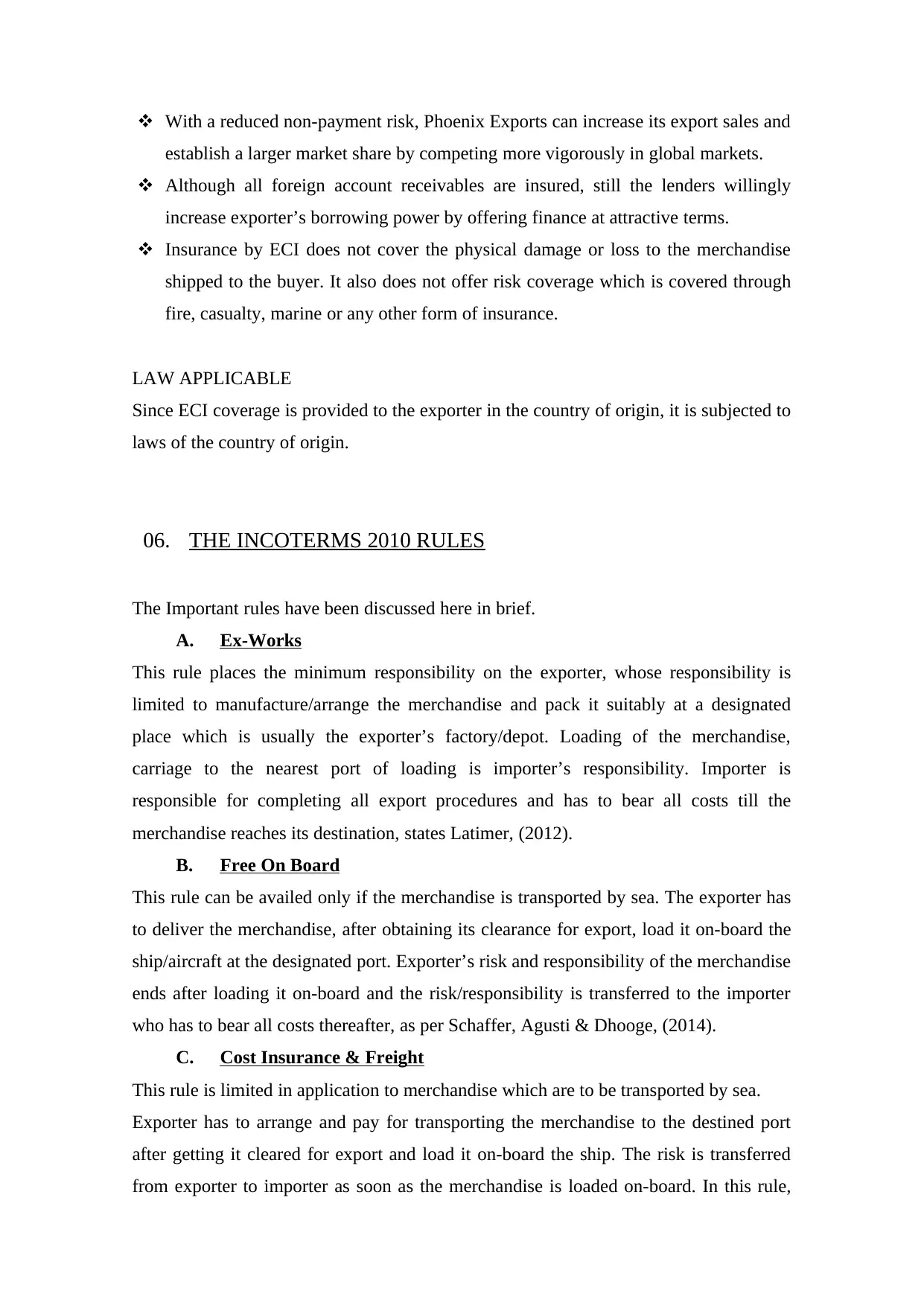
With a reduced non-payment risk, Phoenix Exports can increase its export sales and
establish a larger market share by competing more vigorously in global markets.
Although all foreign account receivables are insured, still the lenders willingly
increase exporter’s borrowing power by offering finance at attractive terms.
Insurance by ECI does not cover the physical damage or loss to the merchandise
shipped to the buyer. It also does not offer risk coverage which is covered through
fire, casualty, marine or any other form of insurance.
LAW APPLICABLE
Since ECI coverage is provided to the exporter in the country of origin, it is subjected to
laws of the country of origin.
06. THE INCOTERMS 2010 RULES
The Important rules have been discussed here in brief.
A. Ex-Works
This rule places the minimum responsibility on the exporter, whose responsibility is
limited to manufacture/arrange the merchandise and pack it suitably at a designated
place which is usually the exporter’s factory/depot. Loading of the merchandise,
carriage to the nearest port of loading is importer’s responsibility. Importer is
responsible for completing all export procedures and has to bear all costs till the
merchandise reaches its destination, states Latimer, (2012).
B. Free On Board
This rule can be availed only if the merchandise is transported by sea. The exporter has
to deliver the merchandise, after obtaining its clearance for export, load it on-board the
ship/aircraft at the designated port. Exporter’s risk and responsibility of the merchandise
ends after loading it on-board and the risk/responsibility is transferred to the importer
who has to bear all costs thereafter, as per Schaffer, Agusti & Dhooge, (2014).
C. Cost Insurance & Freight
This rule is limited in application to merchandise which are to be transported by sea.
Exporter has to arrange and pay for transporting the merchandise to the destined port
after getting it cleared for export and load it on-board the ship. The risk is transferred
from exporter to importer as soon as the merchandise is loaded on-board. In this rule,
establish a larger market share by competing more vigorously in global markets.
Although all foreign account receivables are insured, still the lenders willingly
increase exporter’s borrowing power by offering finance at attractive terms.
Insurance by ECI does not cover the physical damage or loss to the merchandise
shipped to the buyer. It also does not offer risk coverage which is covered through
fire, casualty, marine or any other form of insurance.
LAW APPLICABLE
Since ECI coverage is provided to the exporter in the country of origin, it is subjected to
laws of the country of origin.
06. THE INCOTERMS 2010 RULES
The Important rules have been discussed here in brief.
A. Ex-Works
This rule places the minimum responsibility on the exporter, whose responsibility is
limited to manufacture/arrange the merchandise and pack it suitably at a designated
place which is usually the exporter’s factory/depot. Loading of the merchandise,
carriage to the nearest port of loading is importer’s responsibility. Importer is
responsible for completing all export procedures and has to bear all costs till the
merchandise reaches its destination, states Latimer, (2012).
B. Free On Board
This rule can be availed only if the merchandise is transported by sea. The exporter has
to deliver the merchandise, after obtaining its clearance for export, load it on-board the
ship/aircraft at the designated port. Exporter’s risk and responsibility of the merchandise
ends after loading it on-board and the risk/responsibility is transferred to the importer
who has to bear all costs thereafter, as per Schaffer, Agusti & Dhooge, (2014).
C. Cost Insurance & Freight
This rule is limited in application to merchandise which are to be transported by sea.
Exporter has to arrange and pay for transporting the merchandise to the destined port
after getting it cleared for export and load it on-board the ship. The risk is transferred
from exporter to importer as soon as the merchandise is loaded on-board. In this rule,
Paraphrase This Document
Need a fresh take? Get an instant paraphrase of this document with our AI Paraphraser
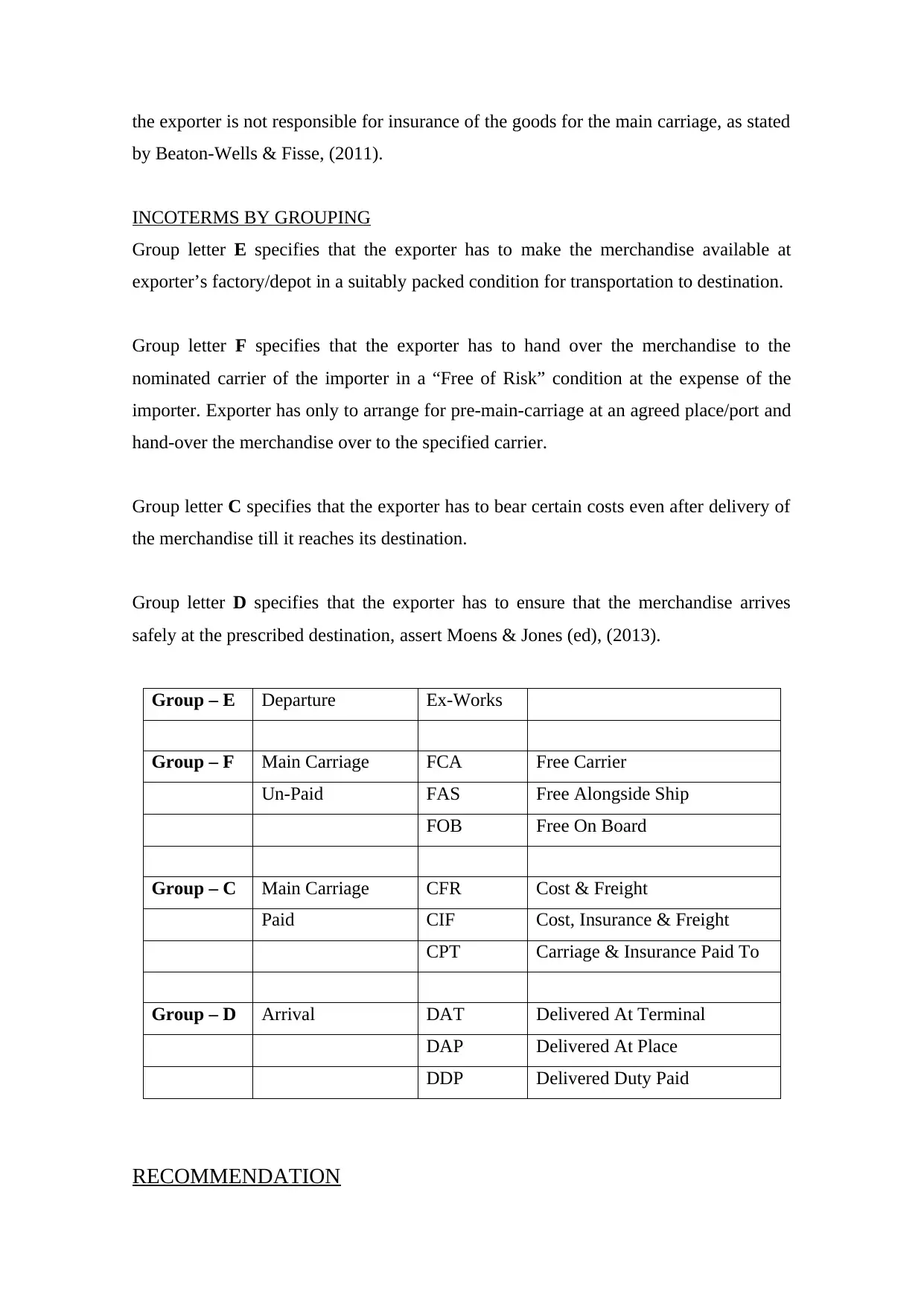
the exporter is not responsible for insurance of the goods for the main carriage, as stated
by Beaton-Wells & Fisse, (2011).
INCOTERMS BY GROUPING
Group letter E specifies that the exporter has to make the merchandise available at
exporter’s factory/depot in a suitably packed condition for transportation to destination.
Group letter F specifies that the exporter has to hand over the merchandise to the
nominated carrier of the importer in a “Free of Risk” condition at the expense of the
importer. Exporter has only to arrange for pre-main-carriage at an agreed place/port and
hand-over the merchandise over to the specified carrier.
Group letter C specifies that the exporter has to bear certain costs even after delivery of
the merchandise till it reaches its destination.
Group letter D specifies that the exporter has to ensure that the merchandise arrives
safely at the prescribed destination, assert Moens & Jones (ed), (2013).
Group – E Departure Ex-Works
Group – F Main Carriage FCA Free Carrier
Un-Paid FAS Free Alongside Ship
FOB Free On Board
Group – C Main Carriage CFR Cost & Freight
Paid CIF Cost, Insurance & Freight
CPT Carriage & Insurance Paid To
Group – D Arrival DAT Delivered At Terminal
DAP Delivered At Place
DDP Delivered Duty Paid
RECOMMENDATION
by Beaton-Wells & Fisse, (2011).
INCOTERMS BY GROUPING
Group letter E specifies that the exporter has to make the merchandise available at
exporter’s factory/depot in a suitably packed condition for transportation to destination.
Group letter F specifies that the exporter has to hand over the merchandise to the
nominated carrier of the importer in a “Free of Risk” condition at the expense of the
importer. Exporter has only to arrange for pre-main-carriage at an agreed place/port and
hand-over the merchandise over to the specified carrier.
Group letter C specifies that the exporter has to bear certain costs even after delivery of
the merchandise till it reaches its destination.
Group letter D specifies that the exporter has to ensure that the merchandise arrives
safely at the prescribed destination, assert Moens & Jones (ed), (2013).
Group – E Departure Ex-Works
Group – F Main Carriage FCA Free Carrier
Un-Paid FAS Free Alongside Ship
FOB Free On Board
Group – C Main Carriage CFR Cost & Freight
Paid CIF Cost, Insurance & Freight
CPT Carriage & Insurance Paid To
Group – D Arrival DAT Delivered At Terminal
DAP Delivered At Place
DDP Delivered Duty Paid
RECOMMENDATION
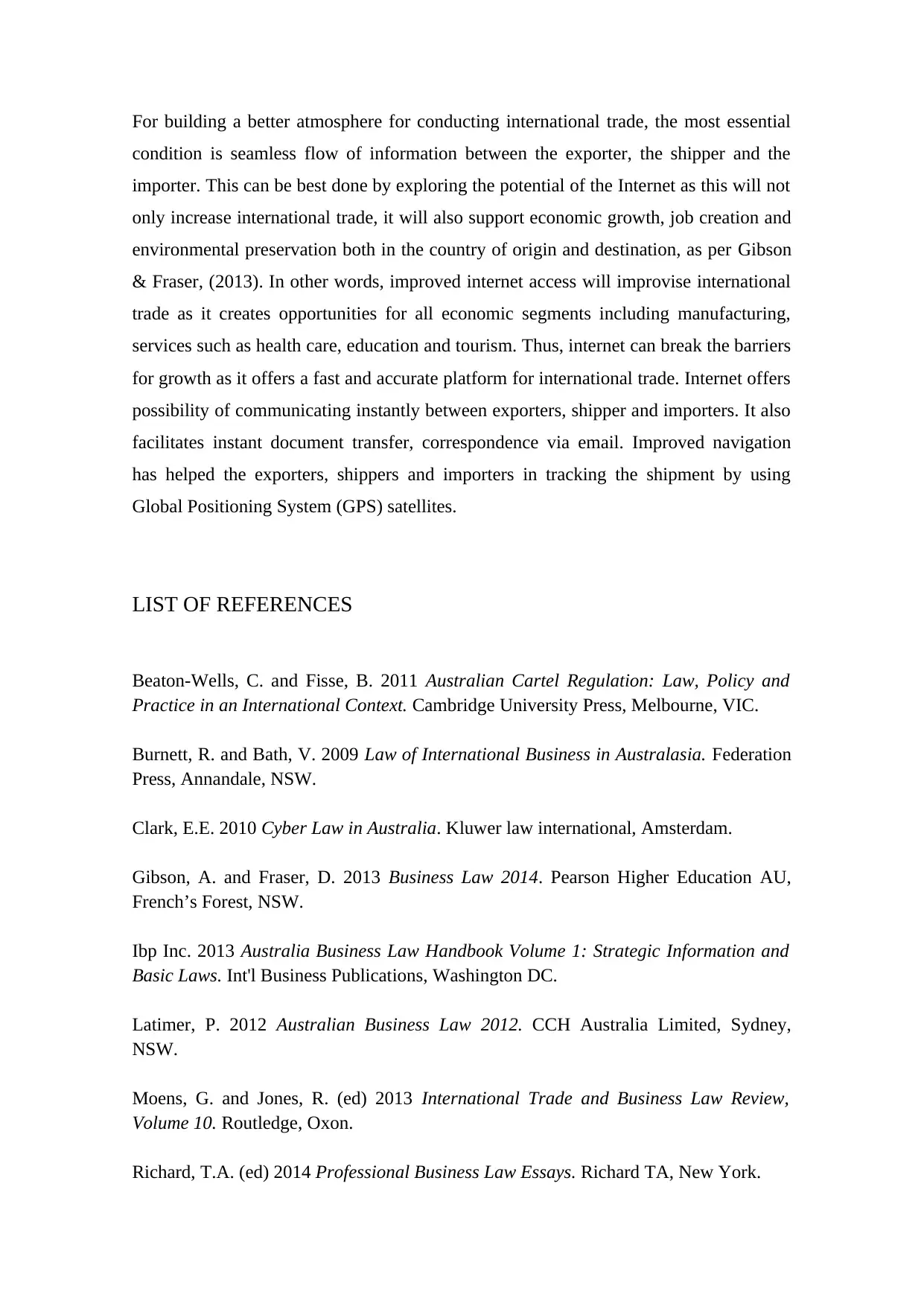
For building a better atmosphere for conducting international trade, the most essential
condition is seamless flow of information between the exporter, the shipper and the
importer. This can be best done by exploring the potential of the Internet as this will not
only increase international trade, it will also support economic growth, job creation and
environmental preservation both in the country of origin and destination, as per Gibson
& Fraser, (2013). In other words, improved internet access will improvise international
trade as it creates opportunities for all economic segments including manufacturing,
services such as health care, education and tourism. Thus, internet can break the barriers
for growth as it offers a fast and accurate platform for international trade. Internet offers
possibility of communicating instantly between exporters, shipper and importers. It also
facilitates instant document transfer, correspondence via email. Improved navigation
has helped the exporters, shippers and importers in tracking the shipment by using
Global Positioning System (GPS) satellites.
LIST OF REFERENCES
Beaton-Wells, C. and Fisse, B. 2011 Australian Cartel Regulation: Law, Policy and
Practice in an International Context. Cambridge University Press, Melbourne, VIC.
Burnett, R. and Bath, V. 2009 Law of International Business in Australasia. Federation
Press, Annandale, NSW.
Clark, E.E. 2010 Cyber Law in Australia. Kluwer law international, Amsterdam.
Gibson, A. and Fraser, D. 2013 Business Law 2014. Pearson Higher Education AU,
French’s Forest, NSW.
Ibp Inc. 2013 Australia Business Law Handbook Volume 1: Strategic Information and
Basic Laws. Int'l Business Publications, Washington DC.
Latimer, P. 2012 Australian Business Law 2012. CCH Australia Limited, Sydney,
NSW.
Moens, G. and Jones, R. (ed) 2013 International Trade and Business Law Review,
Volume 10. Routledge, Oxon.
Richard, T.A. (ed) 2014 Professional Business Law Essays. Richard TA, New York.
condition is seamless flow of information between the exporter, the shipper and the
importer. This can be best done by exploring the potential of the Internet as this will not
only increase international trade, it will also support economic growth, job creation and
environmental preservation both in the country of origin and destination, as per Gibson
& Fraser, (2013). In other words, improved internet access will improvise international
trade as it creates opportunities for all economic segments including manufacturing,
services such as health care, education and tourism. Thus, internet can break the barriers
for growth as it offers a fast and accurate platform for international trade. Internet offers
possibility of communicating instantly between exporters, shipper and importers. It also
facilitates instant document transfer, correspondence via email. Improved navigation
has helped the exporters, shippers and importers in tracking the shipment by using
Global Positioning System (GPS) satellites.
LIST OF REFERENCES
Beaton-Wells, C. and Fisse, B. 2011 Australian Cartel Regulation: Law, Policy and
Practice in an International Context. Cambridge University Press, Melbourne, VIC.
Burnett, R. and Bath, V. 2009 Law of International Business in Australasia. Federation
Press, Annandale, NSW.
Clark, E.E. 2010 Cyber Law in Australia. Kluwer law international, Amsterdam.
Gibson, A. and Fraser, D. 2013 Business Law 2014. Pearson Higher Education AU,
French’s Forest, NSW.
Ibp Inc. 2013 Australia Business Law Handbook Volume 1: Strategic Information and
Basic Laws. Int'l Business Publications, Washington DC.
Latimer, P. 2012 Australian Business Law 2012. CCH Australia Limited, Sydney,
NSW.
Moens, G. and Jones, R. (ed) 2013 International Trade and Business Law Review,
Volume 10. Routledge, Oxon.
Richard, T.A. (ed) 2014 Professional Business Law Essays. Richard TA, New York.
⊘ This is a preview!⊘
Do you want full access?
Subscribe today to unlock all pages.

Trusted by 1+ million students worldwide
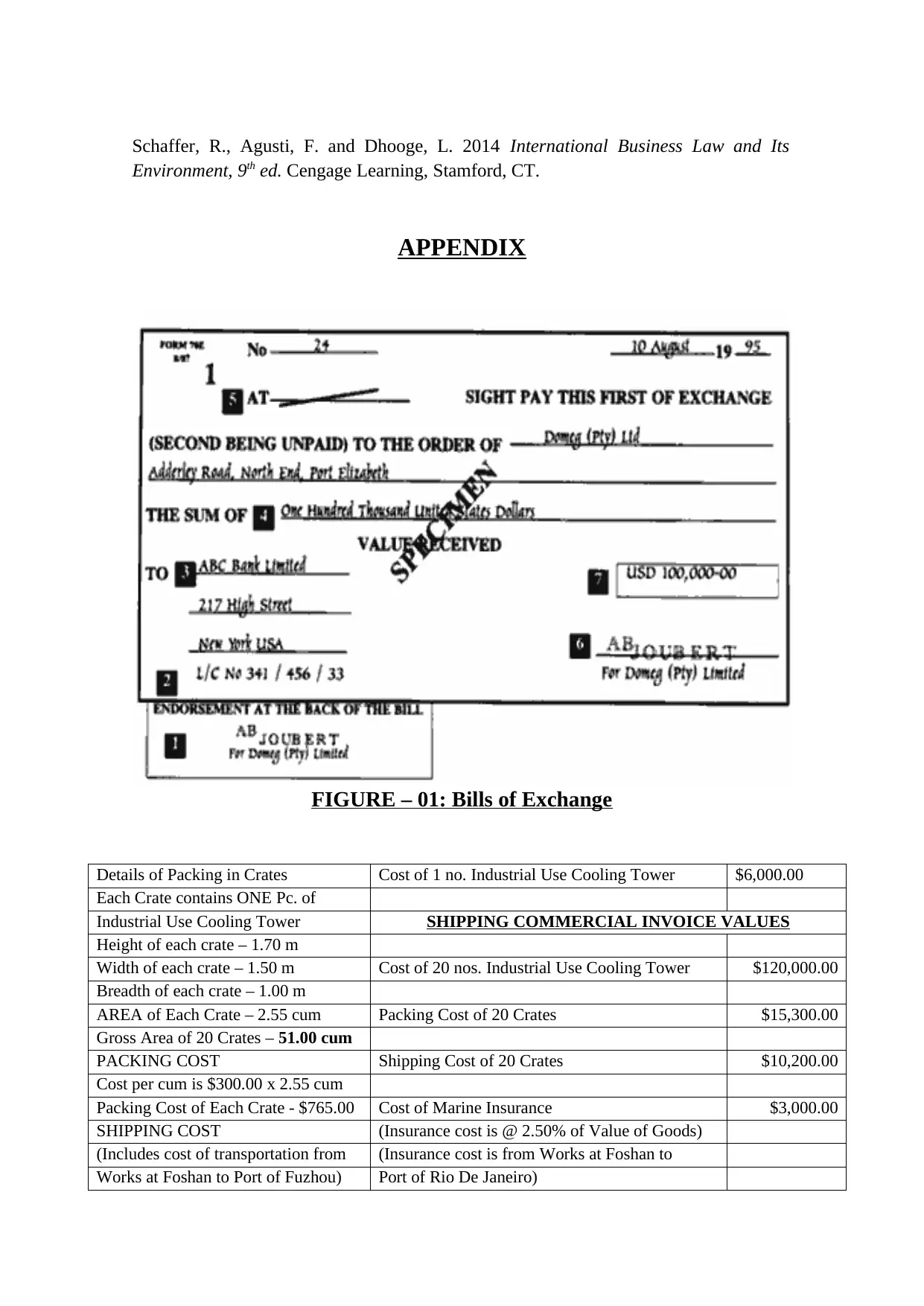
Schaffer, R., Agusti, F. and Dhooge, L. 2014 International Business Law and Its
Environment, 9th ed. Cengage Learning, Stamford, CT.
APPENDIX
FIGURE – 01: Bills of Exchange
Details of Packing in Crates Cost of 1 no. Industrial Use Cooling Tower $6,000.00
Each Crate contains ONE Pc. of
Industrial Use Cooling Tower SHIPPING COMMERCIAL INVOICE VALUES
Height of each crate – 1.70 m
Width of each crate – 1.50 m Cost of 20 nos. Industrial Use Cooling Tower $120,000.00
Breadth of each crate – 1.00 m
AREA of Each Crate – 2.55 cum Packing Cost of 20 Crates $15,300.00
Gross Area of 20 Crates – 51.00 cum
PACKING COST Shipping Cost of 20 Crates $10,200.00
Cost per cum is $300.00 x 2.55 cum
Packing Cost of Each Crate - $765.00 Cost of Marine Insurance $3,000.00
SHIPPING COST (Insurance cost is @ 2.50% of Value of Goods)
(Includes cost of transportation from (Insurance cost is from Works at Foshan to
Works at Foshan to Port of Fuzhou) Port of Rio De Janeiro)
Environment, 9th ed. Cengage Learning, Stamford, CT.
APPENDIX
FIGURE – 01: Bills of Exchange
Details of Packing in Crates Cost of 1 no. Industrial Use Cooling Tower $6,000.00
Each Crate contains ONE Pc. of
Industrial Use Cooling Tower SHIPPING COMMERCIAL INVOICE VALUES
Height of each crate – 1.70 m
Width of each crate – 1.50 m Cost of 20 nos. Industrial Use Cooling Tower $120,000.00
Breadth of each crate – 1.00 m
AREA of Each Crate – 2.55 cum Packing Cost of 20 Crates $15,300.00
Gross Area of 20 Crates – 51.00 cum
PACKING COST Shipping Cost of 20 Crates $10,200.00
Cost per cum is $300.00 x 2.55 cum
Packing Cost of Each Crate - $765.00 Cost of Marine Insurance $3,000.00
SHIPPING COST (Insurance cost is @ 2.50% of Value of Goods)
(Includes cost of transportation from (Insurance cost is from Works at Foshan to
Works at Foshan to Port of Fuzhou) Port of Rio De Janeiro)
Paraphrase This Document
Need a fresh take? Get an instant paraphrase of this document with our AI Paraphraser
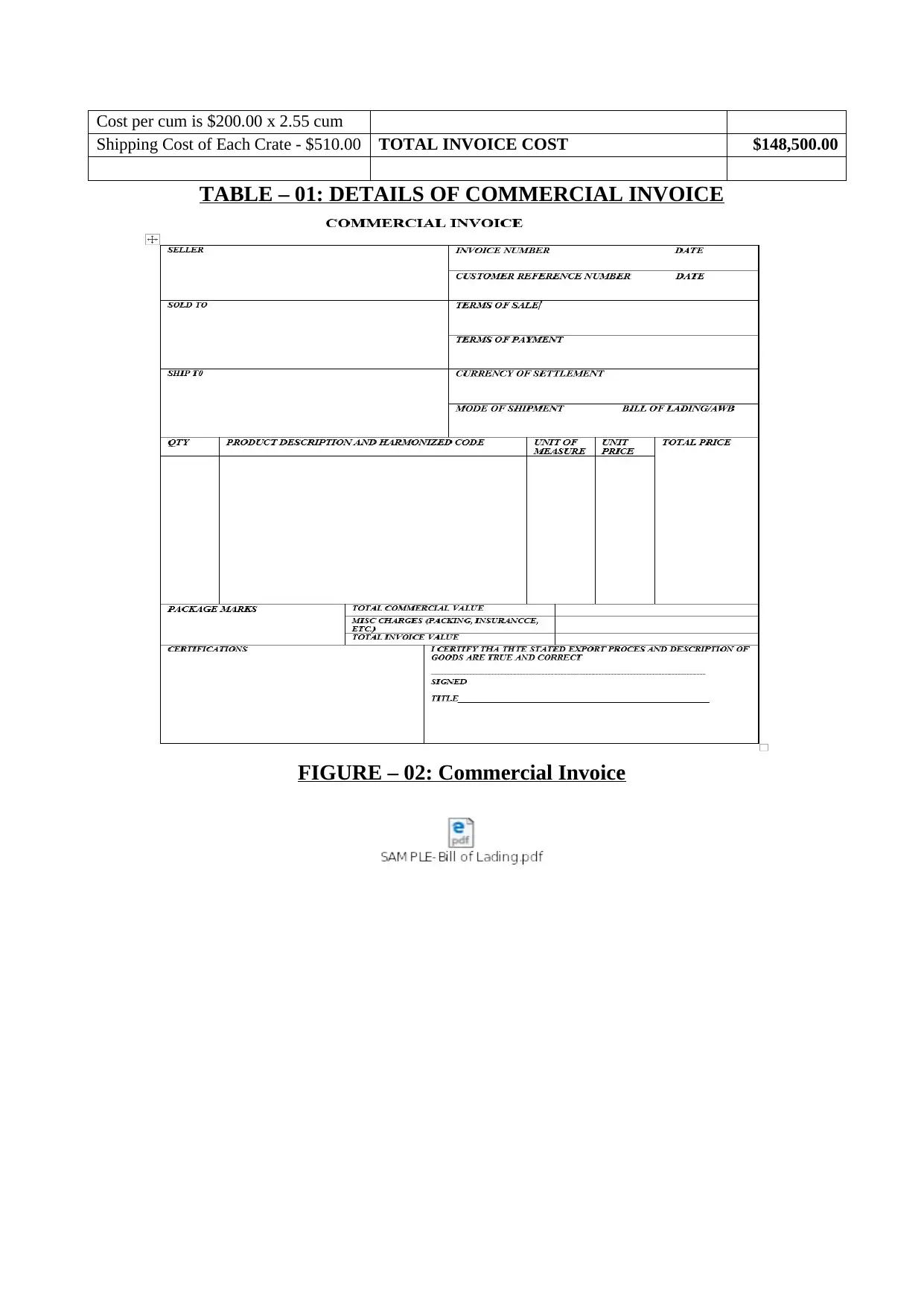
Cost per cum is $200.00 x 2.55 cum
Shipping Cost of Each Crate - $510.00 TOTAL INVOICE COST $148,500.00
TABLE – 01: DETAILS OF COMMERCIAL INVOICE
FIGURE – 02: Commercial Invoice
Shipping Cost of Each Crate - $510.00 TOTAL INVOICE COST $148,500.00
TABLE – 01: DETAILS OF COMMERCIAL INVOICE
FIGURE – 02: Commercial Invoice
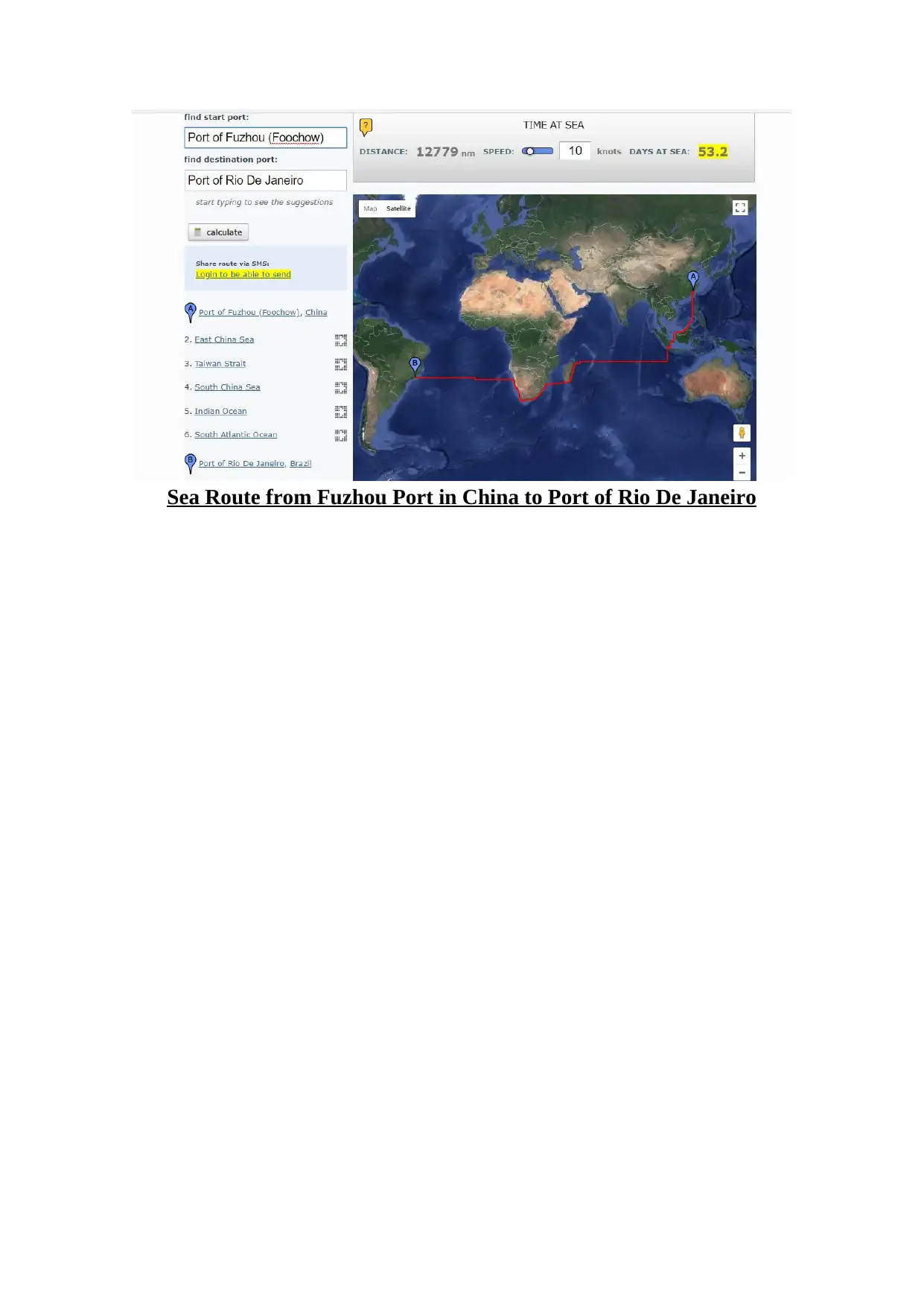
Sea Route from Fuzhou Port in China to Port of Rio De Janeiro
⊘ This is a preview!⊘
Do you want full access?
Subscribe today to unlock all pages.

Trusted by 1+ million students worldwide
1 out of 16
Related Documents
Your All-in-One AI-Powered Toolkit for Academic Success.
+13062052269
info@desklib.com
Available 24*7 on WhatsApp / Email
![[object Object]](/_next/static/media/star-bottom.7253800d.svg)
Unlock your academic potential
Copyright © 2020–2026 A2Z Services. All Rights Reserved. Developed and managed by ZUCOL.





